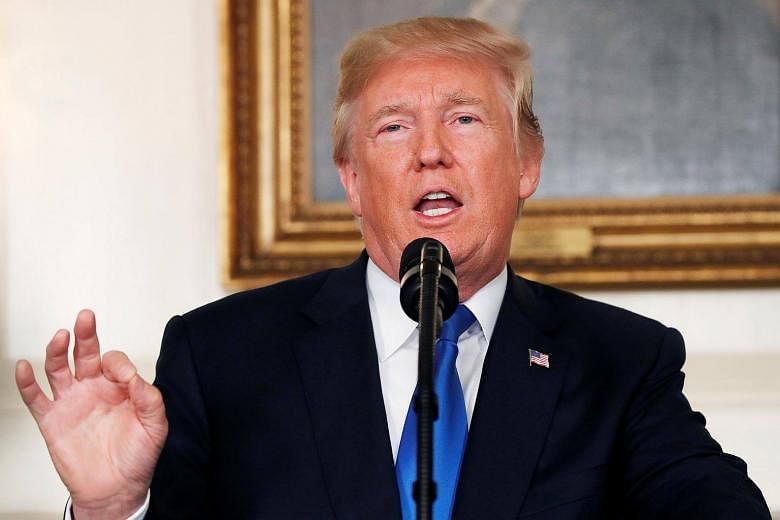By the middle of last year, Mr Emmanuel Macron's victory in France's presidential election, the relative underperformance of populist parties in elections in the Netherlands, and the backlash in the US against President Donald Trump convinced some commentators that the populist wave had peaked.
Pollster Nate Silver expressed the optimist view when he argued that Mr Trump's performance as President and his global unpopularity might further stain populist parties and far-right figures in Europe. On closer inspection, though, such hope appears misplaced.
Over the next two years, populists - who generally pit "the people" against corrupt and privileged elites, attack institutions and position themselves as radical outsiders who will overturn the political order - will keep coming. In so doing, they will demonstrate that their revolution has legs.
Indeed, populists will continue winning in the next two years because mainstream parties, in Europe and parts of Asia, have taken few steps to assuage public anger over inequality, corruption, and a perceived disconnect between politicians and voters.
Populists will also continue to rise because many mainstream parties have tried to demonise individual populists - such as Mr Trump or Philippine President Rodrigo Duterte - rather than treating them like political figures and developing coherent political platforms to oppose them.
Finally, populists are succeeding because, in some countries, mainstream political parties have responded by uniting to form coalition governments, as has now happened in Germany.
In so doing, they give populists the chance to argue that the centre-right and centre-left parties are basically the same - and that new voices are needed to shake up politics.
Indeed, populists are poised to do well even in places, like Italy, that already lived through a long era of populism in the 2000s. They also may do well in Asia, where economic growth has been strong and immigration, a key theme for Western populists, is not a major political issue.
Not all of these populists are the same, of course. Some would throw out political elites, and foster needed reforms, while maintaining commitments to democratic norms.
Yet others seem ready to destroy democracy itself. In Italy, former prime minister Silvio Berlusconi, a Trump-like figure before Mr Trump, is poised for a major political comeback as a kingmaker in next month's general election.
Mr Berlusconi, whose previous periods as prime minister coincided with horrendously low growth rates and a gusher of corruption scandals, is portraying himself as more centrist this time around. But as prime minister, Mr Berlusconi used typical populist strategies to destroy institutions, portray himself as the only source of truthful information and pit elites against "the people".
In Brazil, where national elections will be held in October, populism could make major gains. Mr Jair Bolsonaro, a hard-right populist candidate, leads polls for the first round of the presidential election, if former president Luiz Inacio Lula da Silva is excluded from the survey. (Mr Lula was recently convicted on corruption charges and may not be able to run again.)
The brash Mr Bolsonaro, who speaks favourably of the country's past military dictatorship and appears to endorse torture, presents himself as an outsider populist who would shock Brazil's political system and potentially assume the role of a caudillo.
Even if he does not win, his success would demonstrate that there is a growing market for outsider, even strongman, populism in a country fed up with elite corruption scandals, low growth and inequality.
In Mexico, voters' anger at two of the major parties has put left-leaning populist Andres Manuel Lopez Obrador in the lead for the July presidential election.
In Asia, where populists receive less coverage in the international press than Mr Trump or Mr Berlusconi (with the exception of the brash Mr Duterte in the Philippines), fed-up electorates may vote for massive change in 2018 and 2019.
In Indonesia, former lieutenant-general Prabowo Subianto, who lost the 2014 presidential election, may be making plans for another run next year.
In 2014, he presented himself as a strongman who would be the voice of the people, while publicly criticising Indonesia for becoming, essentially, too democratic. Since 2014, Mr Prabowo has made an apparent alliance with increasingly powerful Islamist groups in the country - an alliance that could help him triumph in 2019.
There are more examples of populism's global strength. British Prime Minister Theresa May hangs onto office with a weak mandate from the public and her own Conservative Party. Many British politicians and publications believe that opposition Labour leader Jeremy Corbyn will eventually reside at 10 Downing Street.
Populism's continuing appeal should remind longstanding, mainstream political parties worldwide that the factors behind the populist wave are, if not universal, found in many different countries now. Furious voters may turn to populist outsiders, like Mr Corbyn, who would shock political systems but not destroy them - or like Mr Prabowo, who could well demolish them.
Either way, 2018 and 2019 will provide more reminders that populism is here to stay.
WASHINGTON POST
•The writer is a senior fellow for South-east Asia at the Council on Foreign Relations.

